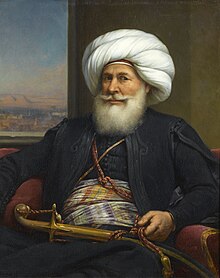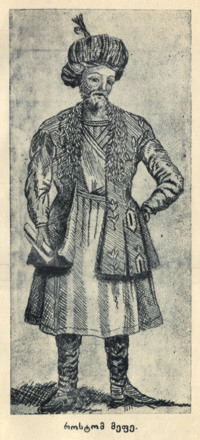Wali (administrative title)
This article needs additional citations for verification. (February 2018) |


Wāli, Wā'lī or vali (from
Algerian term
In Algeria, a wāli is the "governor" and administrative head of each of the 58 provinces of the country, and is chosen by the president.
Iranian term
In
Ottoman Empire term
Vali (translated as "gouverneur-général" in French,
Omani Sultanate term
The
Moroccan term
Since 1997 regionalisation reform, a Wāli is the governor of one of the twelve regions of Morocco.
Pakistani term
In Pakistan, the rulers of the former princely state of Swat were given the title of Wali.
Philippine term
In the Philippines, the term Wa'lī is the name for the titular head of Bangsamoro Autonomous Region in Muslim Mindanao, an autonomous region in the large southern island of Mindanao. The Wa'lī have ceremonial functions and powers such as moral guardianship of the territory and convocation and dissolution of its parliament.[4]
Tunisian term
In
Turkish term
In Turkey a Vali is a provincial governor of one of the 81
See also
Notes
- ^ Some translations in languages used by ethnic minorities:
- Armenian: կուսակալ (kusakal; meaning "governor")[1]
- Bosnian: the expression is adapted to the local idiom and read "valija"
- Ottoman Constitution of 1876 had used "vali", with glaven upravitel (meaning "governor-general") as an explanation.[2]
- Greek: γενικός διοικήτης (genikos dioikētēs), νομάρχης (nomarchēs, which may mean "nomarch" or "prefect of department") or also "valē",[1] βαλή[3]
- Ladino: governador de provinsiya[1]
References
- ^ Martin Luther University) // CITED: p. 41-43 (PDF p. 43-45/338).
- Martin Luther University) // CITED: p. 48 (PDF p. 50/338).
- Martin Luther University) // CITED: p. 45 (PDF p. 47).
- ^ Kabiling, Genalyn (11 September 2014). "PNoy submits draft Bangsamoro law Entity to have 58 exclusive powers; UN, Canada hail move". Manila Bulletin. Manila Bulletin. Retrieved 2 February 2015.
- ISBN 978-90-47-42011-8.
